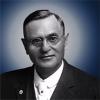 Submitted by Heindel on
Submitted by Heindel on

Returning to our consideration of the spiritual aids to human progress, the Lord's Prayer, which may be considered as an abstract, algebraical formula for the upliftment and purification of all the vehicles of man, the idea of taking proper care of the dense body is expressed in the words: "Give us this day our daily bread."
The prayer dealing with the needs of the vital body is, "Forgive us our trespasses, as we forgive those who trespass against us."
The vital body is the seat of memory. In it are stored the sub-conscious records of all the past events of our life, good or ill, including all injuries inflicted or sustained and benefits received, or bestowed. We remember that the record of the life is taken from those pictures immediately after leaving the dense body at death, and that all the sufferings of post mortem existence are the results of the events these pictures portray.
If, by continual prayer, we obtain forgiveness for the injuries we have inflicted upon others and if we make all the restitution possible, purify our vital bodies by forgiving those who have wronged us, and eliminate all ill feeling, we save ourselves much post mortem misery, besides preparing the way for Universal Brotherhood, which is particularly dependent upon the victory of the vital body over the desire body. In the form of memory, the desire body impresses upon the vital body the idea of revenge. An even temper amid the various annoyances of daily life indicates such a victory, therefore the aspirant should cultivate control of the temper, as it includes work on both bodies. The Lord's Prayer includes this also, for when we see that we are injuring others, we look about and try to find the cause. Loss of temper is one of the causes and it originates in the desire body.
Most people leave physical life with the same temperament they bring into it, but the aspirant must systematically conquer all attempts of the desire body to assume mastery. That can be done by concentration upon high ideals, which strengthens the vital body and is much more efficacious than the common prayers of the Church. The occult scientist uses concentration in preference to prayer, because the former is accomplished by the aid of the mind, which is cold and unfeeling, whereas prayer is usually dictated by emotion. Where it is dictated by a pure unselfish devotion to high ideals prayer is much higher than cold concentration. It can never be cold, but bears upon the pinions of Love the outpourings of the mystic to the Deity.
The prayer for the desire body is, "Lead us not into temptation." Desire is the great tempter of mankind. It is the great incentive to all action, and in so far as the actions subserve the purposes of the spirit, it is good; but where the desire is for something degrading, something that debases the nature, it is indeed meet that we pray not to be led into temptation.
Love, Wealth, Power, and Fame!--These are the four great motives of human action. Desire for one or more of these is the motive for all that man does or leaves undone. The great Leaders of humanity have wisely given them as incentives to action, that man may gain experience and learn thereby. They are necessary, and the aspirant may safely continue to use them as motives for action, but he must transmute them into something higher. He must overcome with nobler aspirations the selfish love which seeks the ownership of another body, and all desires for wealth, power and fame for narrow and personal reasons.
The Love for which he must long is that only which is of the soul and embraces all beings, high and low, increasing in proportion to the needs of the recipient;
The Wealth, that which consists solely of abundance of opportunities to serve his fellow men;
The Power, that alone which makes for the upliftment of humanity;
The Fame, none save that which increases his ability to spread the good news, that all who suffer may thus quickly find solace for the heart's grief.
The prayer for the mind is "Deliver us from evil." We have seen that mind is the link between the higher and the lower natures. Animals are permitted to follow desire without any restriction whatever. In their case, there is neither good nor evil, because they lack mind, the faculty of discrimination. The method of self-protection which we pursue in regard to animals which kill and steal is different from that which we use in relation to human beings who do the same things. Even a human being who is bereft of mind is not held accountable. The fact is recognized that he does not know he is doing wrong, therefore he is simply restrained.
It was only when his mental eyes were opened that man came to know good and evil. When the link of mind becomes allied to the Higher Self and does its bidding, we have the high-minded person. On the contrary, the coalition of the mind with the lower desire nature produces the low-minded person; therefore the meaning of this prayer is that we may be delivered from the experience resulting from the alliance of the mind with the desire body, with all thereby implied.
The aspirant to the higher life accomplishes the union of the higher and the lower natures by means of Meditation on lofty subjects. This union is further cemented by Contemplation, and both these states are transcended by Adoration, which lifts the spirit to the very Throne.
The Lord's Prayer, given for the general use of the Church, gives Adoration first place, in order to reach the spiritual exaltation necessary to proffer a petition representing the needs of the lower vehicles. Each aspect of the threefold spirit, commencing with the lowest, raises itself in adoration to its corresponding aspect of Deity. When the three aspects of the spirit are all arrayed before the Throne of Grace, each utters the prayer appropriate to the needs of its material counterpart, all three joining in the closing prayer for the mind.
The human spirit soars to its counterpart, the Holy Spirit (Jehovah), saying "Hallowed be Thy Name."
The life spirit bows before its counterpart, The Son (Christ), saying "Thy Kingdom Come."
The divine spirit kneels before its counterpart, The Father, with the prayer, "Thy Will be done."
Then the highest, the divine spirit, petitions the highest aspect of the Deity, the Father, for its counterpart, the dense body: "Give us this day our daily bread."
The next highest, the life spirit, prays to its counterpart, the Son, for its counterpart in the lower nature, the vital body: "Forgive us our trespasses as we forgive those who trespass against us."
The lowest aspect of the spirit, the human spirit, next offers its petition to the lowest aspect of Deity for the highest of the threefold bodies, the desire body: "Lead us not into temptation."
Lastly, in unison, all three aspects of the threefold spirit in man join in the most important of the prayers, the petition for the mind, in the words: "Deliver us from evil."
The introduction, "Our Father Who art in Heaven," is merely as the address on an envelope. The addition, "For Thine is the Kingdom, and the Power, and the Glory, forever. Amen," was not given by Christ, but is very appropriate as the parting adoration of the threefold spirit as it closes its direct address to the Deity.
- 481 reads